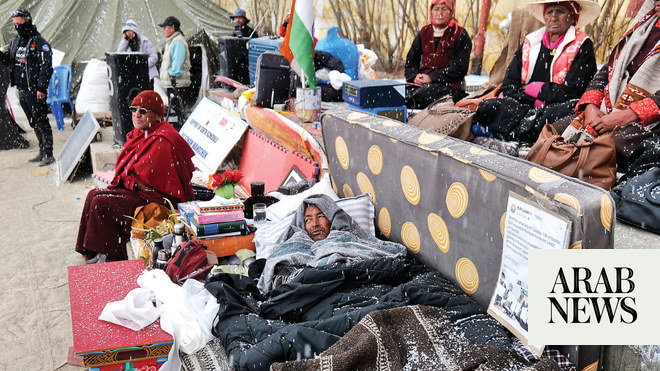
NEW DELHI: India’s ruling Bharatiya Janata Party on Monday gave assurances to the people of the federally administered Himalayan region of Ladakh over concerns about land rights and cultural identity.
The pledge came as the region on Monday observed a shutdown demanding statehood and protection of land and job rights for local people.
Ladakh became federally administered after the division of the state of Jammu and Kashmir into the union territories of Ladakh, and Jammu and Kashmir, in August 2019.
Two years ago, the Indian government abrogated Article 370 and 35 (A) of the constitution that gave limited autonomy to Jammu and Kashmir and granted exclusive rights over land and jobs to the people of the whole region.
The BJP said the government was willing to protect Ladakh’s rights over land and jobs.
Ashok Kaul, the party’s general secretary in Jammu and Kashmir, and Ladakh, told Arab News: “The BJP believes that the people of Ladakh should get constitutional warranty so that land, jobs, and culture should be protected.”
The people of Ladakh have felt a sense of insecurity over outsiders taking jobs in the region and tampering with their culture.
The rights movement has been led by Leh, the largest town of Ladakh, and the all-religious grouping of the Apex Body, and Kargil Democratic Alliance. It has demanded the granting of statehood to Ladakh, constitutional safeguards under the Sixth Schedule or similar-like status, two parliamentary seats to the region, and the filling of up to 12,000 vacancies in government departments.
The Sixth Schedule of the constitution provides autonomy for communities through the creation of autonomous development councils that can frame laws on land, public health, agriculture, and others.
Kaul said: “We don’t agree with the demand for statehood and putting the region under the Sixth Schedule.”
The Apex Body, however, noted that the demands for Ladakh’s safeguards under the Sixth Schedule were important.
Gonbo Lba, a member of the Apex Body, told Arab News: “The shutdown is to tell the government in Delhi to take our opinion and discuss the issues affecting Ladakh with us. For the people of Ladakh, the Sixth Schedule is important to protect our rights and identity.”
Chering Dorje Lakrook, another Apex Body member and a former member of the BJP regional council, said: “The shutdown has been totally successful in all the regions of Ladakh, be it Leh or Kargil.
“We called the shutdown in protest against the Home Ministry not calling a meeting of the Ladakh leaders to discuss the problems being faced by Ladakh.
“Land and job protection and cultural identity are important because our rights over land were protected under Article 370 when we were part of Jammu and Kashmir. If we don’t get protection our identity will vanish, that’s why we are fighting.
“No doubt the government removed Article 370 but other states in northeastern India are having Sixth Schedule under which their autonomy and rights are protected,” Lakrook added.
Ladakh has a population of around 300,000 people made up of 52 percent Muslims and 48 percent Buddhists with most of the Muslims based in Kargil.
There was some division between the two regions on the question of the repeal of Article 370 with the Buddhist-dominated region supporting the abrogation while the Muslims opposed it. Now, both the regions of Ladakh are on the same page over the special constitutional rights of locals and the protection of their identity and jobs.
Sajjad Hussain Kargili, a Kargil-based political activist, said: “When the government abrogated Article 370 it said that it had merged Kashmir with India, therefore we demand that the people of Ladakh should have representation in both houses of parliament.”
Ladakh currently sends one member to the Lower House of parliament.
“The people of Ladakh, be they Muslim or Buddhist, want the empowerment of the people of Ladakh and the protection of the indigenous culture and rights,” Kargili added.
Srinagar-based political analyst, Prof. Siddiq Wahid, told Arab News: “So, what exactly is it that the government has accomplished after its August 2019 actions in the former state of Jammu and Kashmir? Is this a vacuum in governance or a government that does not care?”









